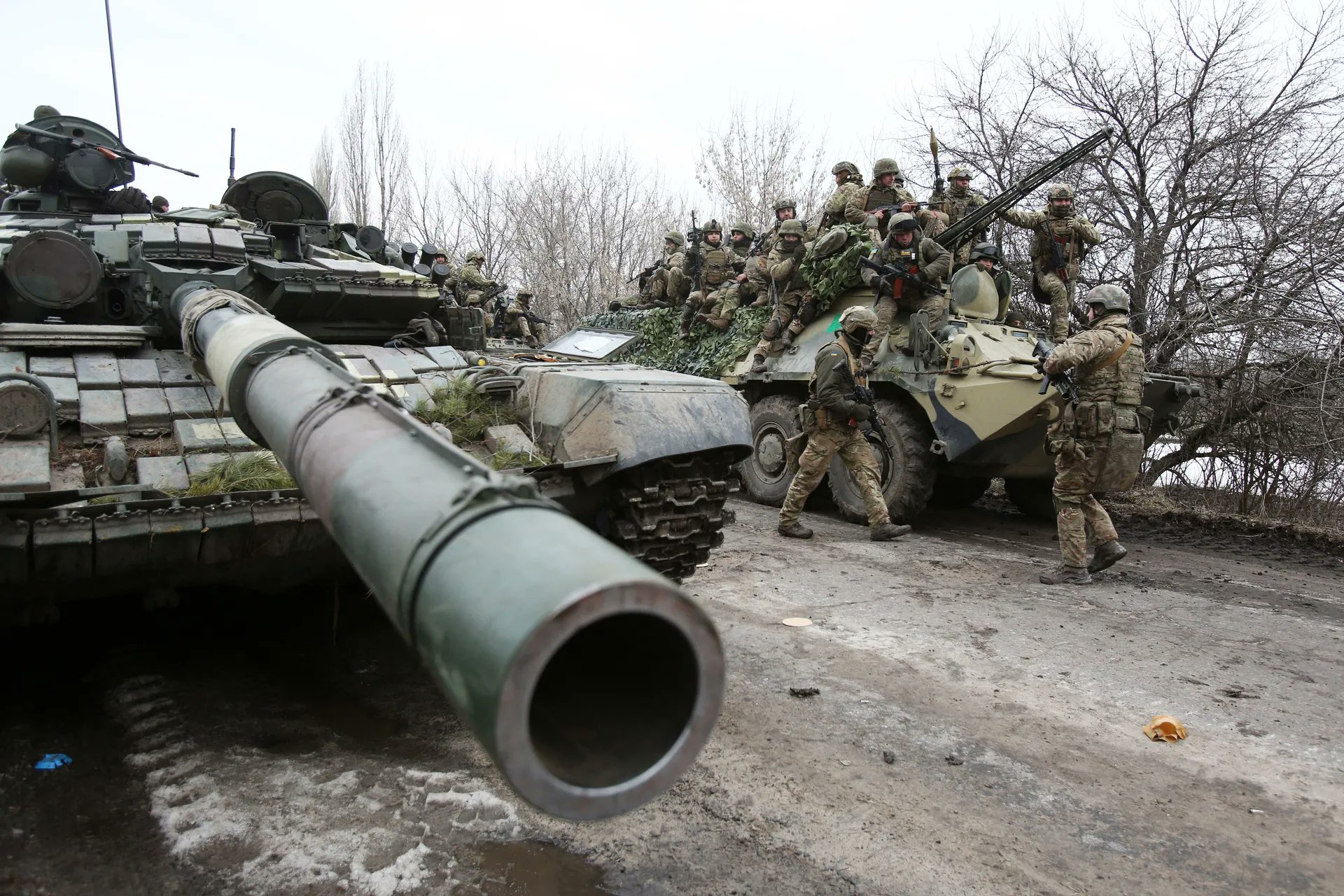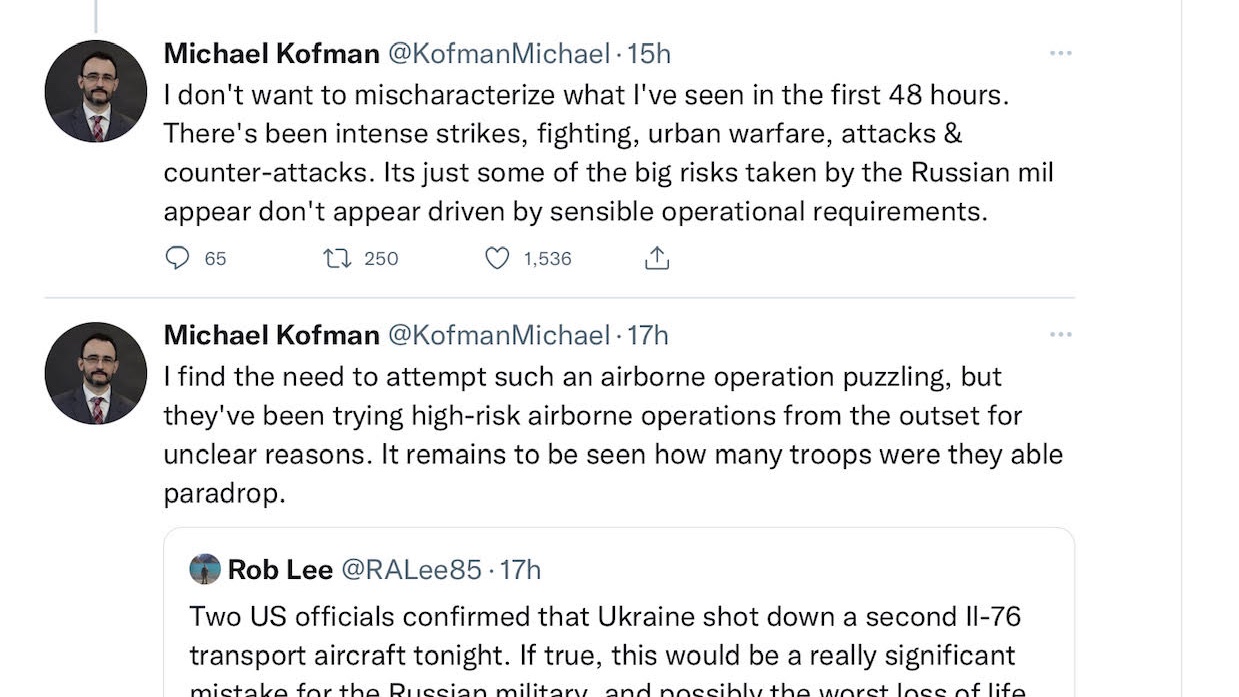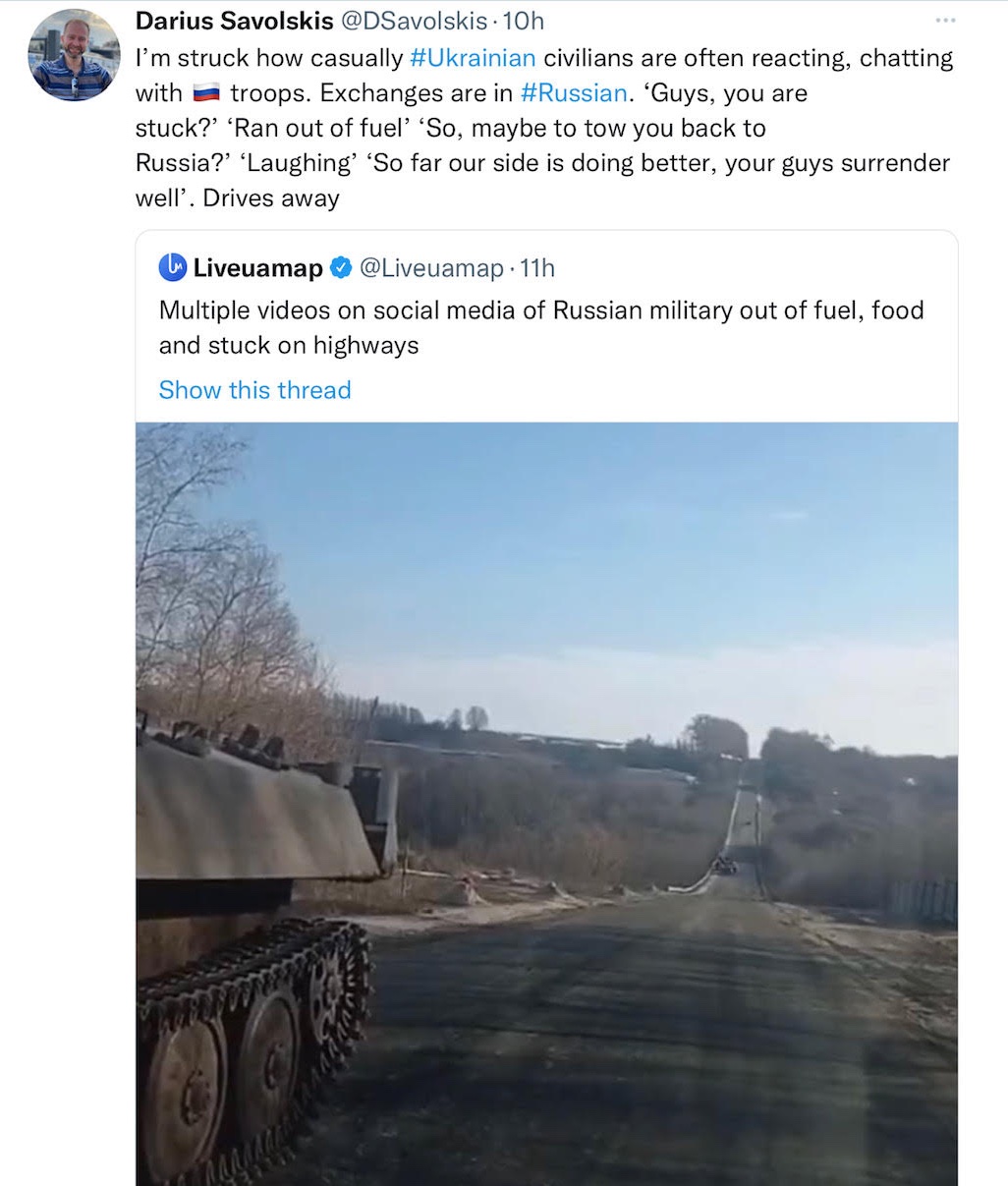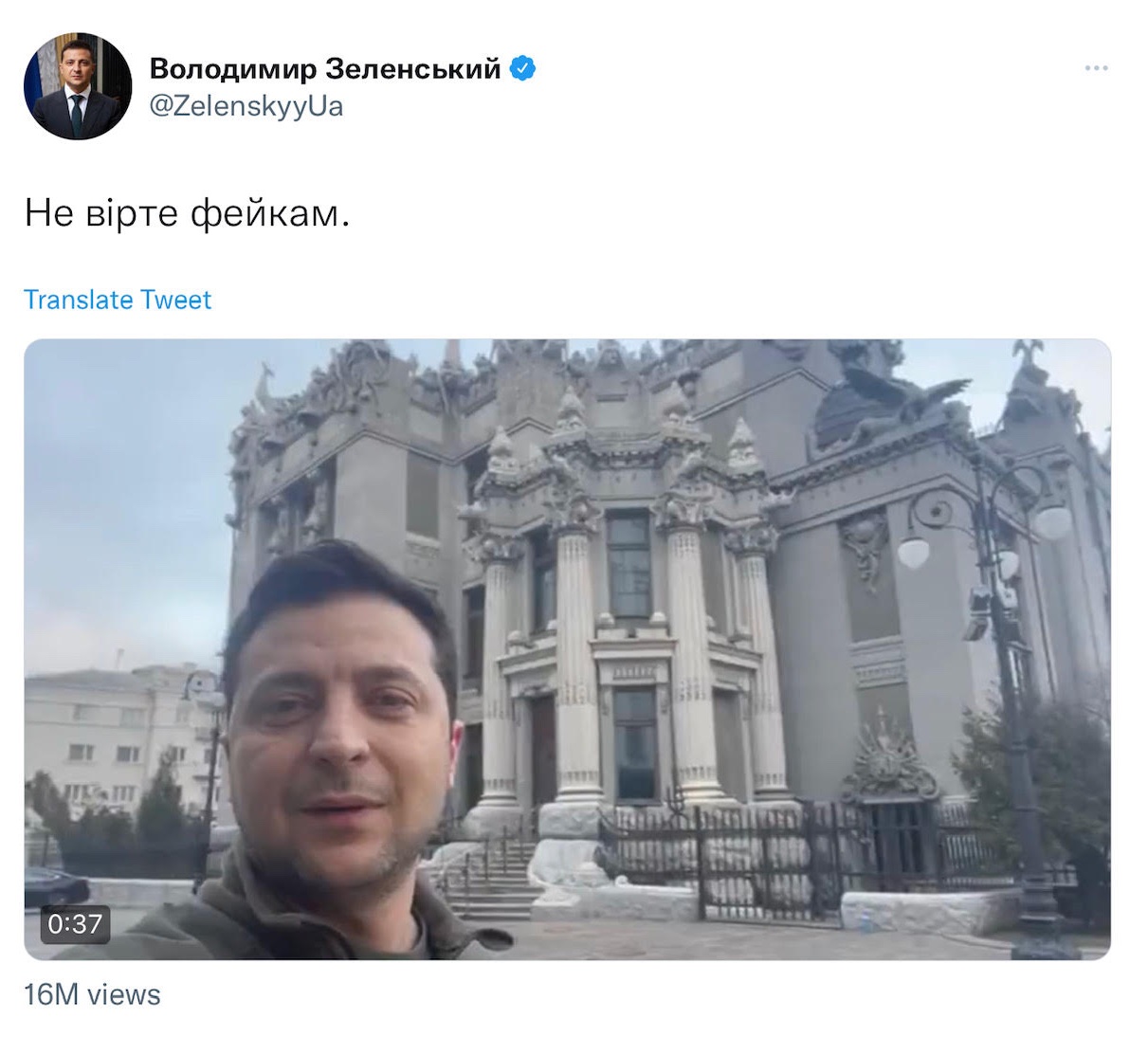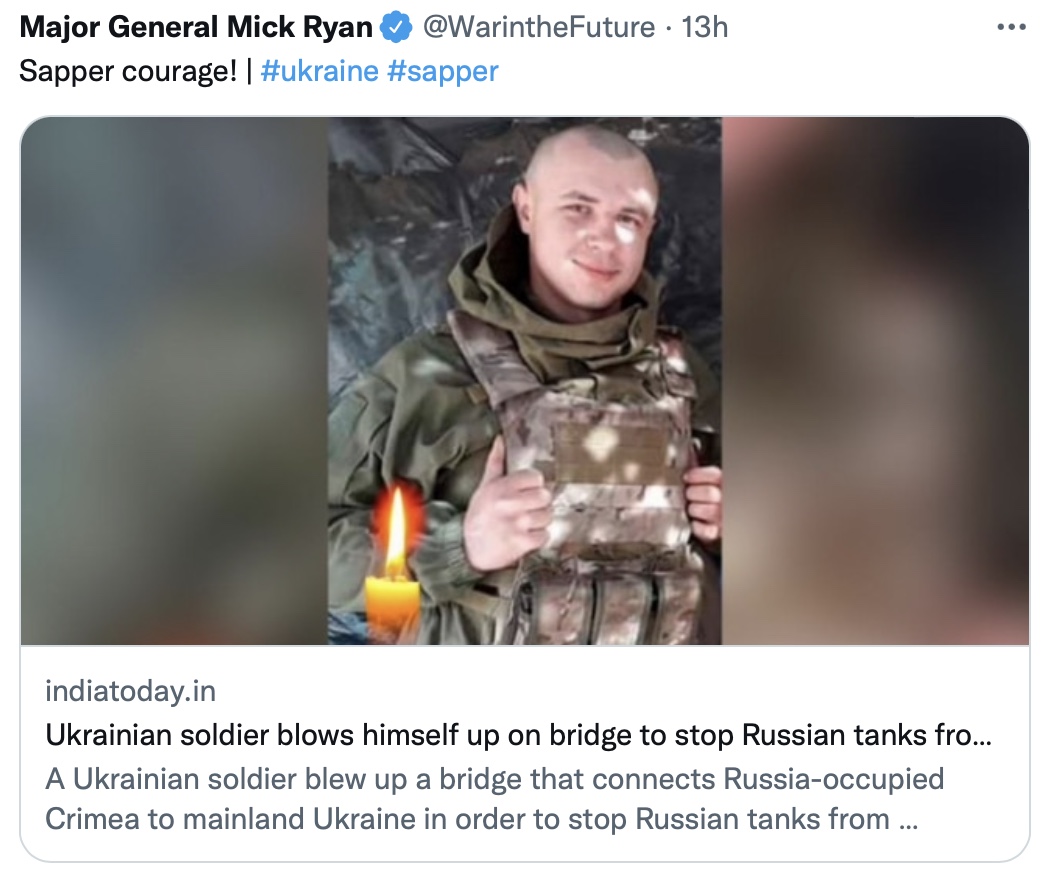Thread by Major General Mick Ryan
Thread
Three days since the invasion began. In the past 24 hours, we have seen Russian advances in the north, south and east. Ground gained in the north has been particularly costly for Russian forces. My 3rd set of observations, noting the ongoing abundance of ambiguity. 1/24
2/24 Superb reporting continues from many sources on the Russian invasion of Ukraine. This includes @KofmanMichael @maxseddon @IAPonomarenko @RALee85 @shashj @DanLamothe @ikhurshudyan @McFaul @defenceHQ @thestudyofwar among many others.
3/24 The Russian campaign so far has been unimaginative and plodding. They are clearly seeking a low-cost victory, partly because they know they need to govern Ukraine if they are successful.
4/24 Russian airborne thrusts have demonstrated the inherent limitations of such operations. As @kofman has noted, these deep operations by light forces also don’t appear to be driven by sensible operational needs.
5/24 And the fact that the Russians, with an air force that is vastly bigger and more capable, did not achieve air superiority before the invasion is another telling factor in either Russian arrogance - or their lack of integration in the joint force.
6/24 At the same time, the Russian doctrinal preference for disrupting, degrading, or destroying adversary command and control through artillery, missile strikes, air strikes, cyber/electronic warfare, and ground combat does not appear to be working (yet).
7/24 There has been some online discussion, from social media but also from @defenceHQ about Russian logistical problems. The reality is that in any large-scale advance by land forces, logistics is ALWAYS an issue.
8/24 We train our combat forces to be aggressive in the advance and to exploit opportunities where they find them. Sometimes this means they outrun the logistic support of even the best military organisations.
10/24 Back to assumptions of a lightning war by the Russians - another factor in logistics might be that the Russians weighted the invasion force in favour of combat units in the hope of overwhelming and overawing the Ukrainians quickly. Hope is a bad planning assumption!
11/24 We should also not discount that the Russian forces are just not up to this task without resort to more traditional methods of methodical, highly destructive warfare. They may have to eschew their recent theoretical developments in warfare to be successful.
12/24 With the Russians advancing slowly on multiple fronts, their main effort seems to be the capture of Kyiv. Watch for second echelon forces, heavier artillery, air attacks, more infiltration attempts, cyber, influence & EW activities in support of this.
13/24 Their Ukrainian opponents have clearly planned and wargamed their overall defensive scheme of maneuver over many years. It appears to be methodical, disciplined with a clear sense of what is important to defend, and what is not.
14/24 Ukrainian leadership so far has been impressive. The President has provided a central, unifying presence for his people. He appears tired but functioning well, and he is maintaining a dialog with his people and the outside world.
15/24 In the coming days, the Ukrainian President however will need to make some very hard decisions on the defence of Kyiv, which is likely to be a very destructive and bloody urban fight. He will also need to decide on staying or going.
16/24 Neither are simple or easy decisions, and both will have a significant impact on the war and its outcome. And, potentially, any subsequent insurgency.
17/24 Military leadership in the Ukrainian forces so far has also stood the ultimate test of military leaders – combat. This has been in evidence from their senior leadership deploying military forces & keeping their people informed, to their tactical operations.
18/24 The Ukrainians have been masters in the use of strategic communications to provide transparency for the world about the Russian invasion. They have also provided inspiring stories, such as this heroic sapper, that provides the iron in the spine of soldiers & civilians.
19/24 Good leadership has always been a defining feature of successful combat forces. With their military leaders, the Ukrainians seem to have managed to sustain a good balance of what Andrew Gordon in ‘Rules of the Game’ called ‘ratcatchers’ and ‘regulators’.
20/24 The ratcatchers are the warfighters and combat leaders who have spent their lives dedicated to the study of war, combat and military leadership. They are the ones, at each level, who win wars.
21/24 The regulators are those who, in peacetime, maximise their promotion potential through the study of process, attendance at committees and focus on the bureaucratic side of military organisations. You need some of these in war and peace, but not too many.
22/24 It does help to have a clear and present threat to build and maintain the right balance of the two military leadership styles.
23/24 But my observation is that in many western military institutions (including my own), the regulators have been on the ascendant for many years. This must change if we are to successfully defend against the forces of high-tech authoritarian regimes in the years ahead.
24/24 My observations, part 3, ends. Sorry for the length of the thread! More tomorrow.
